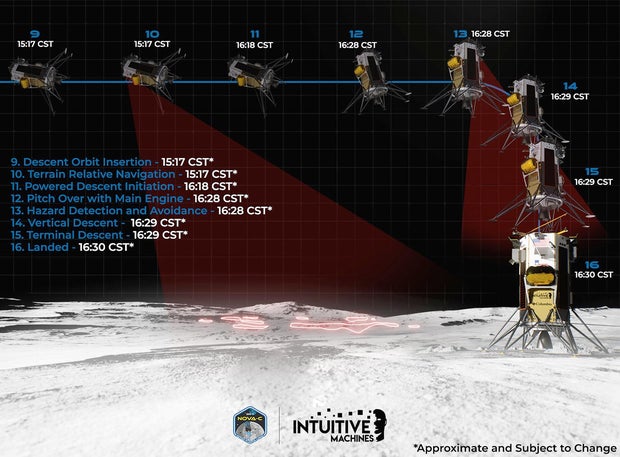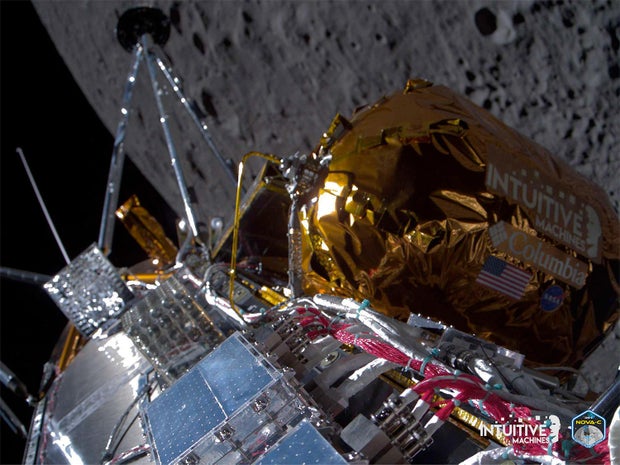CBS News
First U.S. moon landing since 1972 set to happen today as spacecraft closes in on lunar surface

Houston-based Intuitive Machines readied its Odysseus lander for touchdown on the moon today, a nail-biting one-hour 13-minute descent from orbit to become the first U.S.-built spacecraft to stick a moon landing in more than 50 years and the first ever by a private company.
One day after braking into a 57-mile-high orbit tilted 80 degrees to the moon’s equator, Odysseus’ methane-fueled main engine was primed to ignite at 4:17 p.m. EST, lowering the far side of the orbit to a point near the landing site some 186 miles from the moon’s south pole.
Intuitive Machines
As the 14-foot-tall spacecraft descends toward the surface, on-board cameras and lasers are programmed to scan the ground below to identify landmarks, providing steering inputs to the lander’s guidance system to help fine tune the trajectory.
One hour later, at 5:18 p.m., the main engine is expected to ignite again at an altitude of about 18 miles and to keep firing for the final 10 minutes of the descent, flipping Odysseus from a horizontal orientation to vertical and dropping straight down at just under 4 mph.
As the spacecraft drops below 100 feet, an innovative camera package, known as “EagleCam,” built by students at Embry-Riddle Aeronautical University, will fall away and attempt to photograph the lander’s final descent from the side. NASA cameras on board the spacecraft will photograph the ground directly below.
By the time Odysseus reaches an altitude of about 33 feet above the surface, the main engine was to have throttled down to the planned landing velocity of about 2.2 mph — walking speed for senior citizens.
Touchdown near a crater known as Malapert A is expected at 5:30 p.m., one week after launch from the Kennedy Space Center.
Intuitive Machines
Video from the lander’s on-board cameras and the EagleCam cannot be transmitted back to Earth in real time, but Intuitive Machines’ engineers at the company’s Nova Control center in Houston say they should be able to verify touchdown within about 15 seconds. The first pictures are expected within a half hour or so.
A successful lunar landing would mark the first touchdown by a U.S.-built spacecraft since the Apollo 17 mission in 1972 and the first ever by a privately-built spacecraft.
Pittsburg-based Astrobotic hoped to claim that honor last month with its Peregrine lander, but the mission was derailed by a ruptured propellant tank shortly after launch Jan. 9. Two earlier private moon ventures, one by Israel and the other by Japan, also ended in failure.
Only the governments of the United States, Russia, China, India and Japan have successfully put landers on the surface of the moon, and Japan’s “SLIM” lander was only partially successful, tipping over on touchdown Jan. 19.
Peregrine and Odysseus were both funded in part by NASA’s Commercial Lunar Payload Services program, or CLPS (pronounced CLIPS), designed to encourage private industry to develop transportation capabilities that NASA can then use to transport payloads to the moon.
Intuitive Machines
The agency’s goal is to help kickstart development of new technologies and to collect data that will be needed by Artemis astronauts planning to land near the moon’s south pole later this decade.
NASA paid Astrobotic $108 million for its part in the Peregrine mission and another $129 million for the Odysseus instruments and transportation to the moon.
What’s on board the Odysseus moon lander?
Odysseus was equipped with six NASA instruments and another six commercial payloads, including small moon sculptures by the artist Jeff Koons, proof-of-concept cloud storage technology, Columbia Sportswear insulation blankets and a small astronomical telescope.
Among the NASA experiments: an instrument to study the charged particle environment at the moon’s surface, another designed to test navigation technologies and the downward-facing cameras designed to photograph how the lander’s engine exhaust disrupts the soil at the landing site.
Also on board: an innovative sensor using radio waves to accurately determine how much cryogenic propellant is left in a tank in the weightless environment of space, technology expected to prove useful for downstream moon missions and other deep space voyages.
Odysseus and its instruments are expected to operate on the surface for about a week, until the sun sets at the landing site. At that point, the lander’s solar cells will no longer be able to generate power and the spacecraft will shut down. Odysseus was not designed to survive the ultra-cold lunar night.
CBS News
Susan Smith up for parole 30 years after drowning her two sons in a South Carolina lake

Watch CBS News
Be the first to know
Get browser notifications for breaking news, live events, and exclusive reporting.
CBS News
American Airlines’ new system cracks down on passengers trying to board plane early

Watch CBS News
Be the first to know
Get browser notifications for breaking news, live events, and exclusive reporting.
CBS News
Putin just approved a new nuclear weapons doctrine for Russia. Here’s what it means.

Russian President Vladimir Putin approved changes to his country’s nuclear doctrine this week, formally amending the conditions — and lowering the threshold — under which Russia would consider using its nuclear weapons. Moscow announced Tuesday that Putin had signed off on the changes to the doctrine, formally known as “The basics of state policy in the field of nuclear deterrence,” as Ukraine launched its first strike deeper into Russia using U.S.-supplied missiles.
The updated doctrine states that Russia will treat an attack by a non-nuclear state that is supported by a country with nuclear capabilities as a joint attack by both. That means any attack on Russia by a country that’s part of a coalition could be seen as an attack by the entire group.
Under the doctrine, Russia could theoretically consider any major attack on its territory, even with conventional weapons, by non-nuclear-armed Ukraine sufficient to trigger a nuclear response, because Ukraine is backed by the nuclear-armed United States.
Putin has threatened to use nuclear weapons in Ukraine multiple times since he ordered the full-scale invasion of the country on Feb. 24, 2022, and Russia has repeatedly warned the West that if Washington allowed Ukraine to fire Western-made missiles deep into its territory, it would consider the U.S. and its NATO allies to be directly involved in the war.
U.S. officials said Ukraine fired eight U.S.-made ATACMS missiles into Russia’s Bryansk region early Tuesday, just a couple days after President Biden gave Ukraine permission to fire the weapons deeper into Russian territory. ATACMS are powerful weapons with a maximum range of almost 190 miles.
“This is the latest instance of a long string of nuclear rhetoric and signaling that has been coming out of Moscow since the beginning of this full scale invasion,” Mariana Budjeryn, Senior Research Associate at Harvard’s Belfer Center, told German broadcaster Deutsche Welle when the change to Russia’s nuclear doctrine was first proposed last month.
“The previous version of the Russian doctrine adopted in 2020 allowed also a nuclear response to a large-scale conventional attack, but only in extreme circumstances where the very survival of the state was at stake,” Budjeryn noted. “This formulation has changed to say, well, extreme circumstances that jeopardize the sovereignty of Russia. Well, what does that really mean and who defines what serious threats to sovereignty might constitute?”
Budjeryn said Russia had already used weapons against Ukraine that could carry a nuclear payload.
“Russia has been using a number of delivery systems of missiles that [can] also come with a nuclear warhead. So these are dual capable systems. For example, Iskander M short range ballistic missiles. Those have been used extensively in this war by Russia. So when we have an incoming from Russia to Ukraine and we see that it’s an Iskander missile, we don’t know if it’s nuclear tipped or conventionally tipped,” Budjeryn said.
Ukrainian parliamentarian Oleksandra Ustinova, who says she helped lobby the Biden administration for the permission for Ukraine to fire the ATACMS deeper inside Russia, told CBS News she didn’t believe Putin would actually carry out a nuclear strike.
“He keeps playing and pretending like he’s going to do something,” Ustinova said. “I’ve been saying since day one that he’s a bully, and he’s not going to do that.”
contributed to this report.










